Wouldn’t it be nice if on Nov 5 Kamala Harris’s Democrats could do something like Susan Holt’s Liberals in Canadian province of New Brunswick on Oct 21??
Oct 22nd, 2024 | By Counterweights Editors | Category: In BriefCOUNTERWEIGHTS EDITORS. GANATSEKWYAGON, ON. TUESDAY, OCTOBER 22, 2024. New Brunswick, some might stress, is the third smallest province in the present Canadian confederation. It is also the second largest province in Atlantic Canada, with a population — 854,355 as of the Third Quarter 2024 — somewhere in between the two Dakotas in the USA.
To counter its modest population weight the province has historical distinctions. It was a haven for two different 18th century political and cultural refugees on the North American continent. And this history still echoes in the present.
Most recently, as it were, officials of the British empire created the Province of New Brunswick out of the old mainland Nova Scotia in 1784, as a new British North American homeland for Loyalist supporters of the “United Empire,” who left the new United States after the American War of Independence, 1775– 1783.
As explained on the current Parks Canada website : “On 10 May 1783 the Spring Fleet, carrying over 2000 Loyalists, arrived at the Saint John River mouth … A second fleet in June, a third in September carrying troops of the Loyalist corps, and numerous individual vessels swelled the number crowded at the river mouth.”
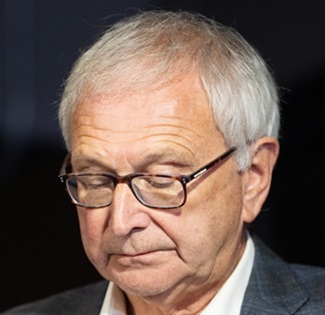
According to the online Dictionary of Canadianisms on Historical Principles, in 1784 the new New Brunswick became the ”Loyalist Province … because originally settled by United Empire Loyalists.”
The “originally settled” here is of course (albeit as all too usual) a major misnomer. (It echoes eg in claims about English as the “common language” sometimes advanced by such 21st century Conservatives as the just defeated former New Brunswick Premier Blaine Higgs.)
Just to start with, to pretend the place was “originally settled” by anglophone empire loyalists ignores what the provincial government bureaucracy now calls the “approximately 17,510 First Nations people in New Brunswick — 10,098 on reserve and 7,412 off reserve.”
Somewhat more recently (but still broadly before the anglophone Loyalist migrations), the old mainland Nova Scotia would become a refuge for descendants of the 17th century migrants from France, who settled francophone Acadia in what is now Atlantic Canada.
During the British empire’s somewhat neurotic “Acadian Deportation and Return” (1755–1803) many descendants of these “Acadien” francophone settlers wound up as “Cajuns” in the later US state of Louisiana.
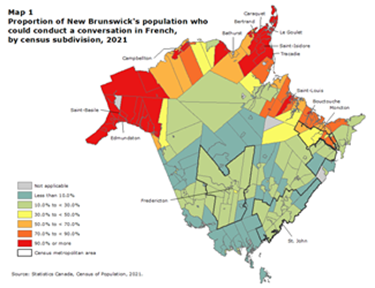
Some Acadians, however, managed to escape deportation, and others later returned. Ironically enough, these survivors became concentrated in the north end of the of the empire’s new Loyalist Province of New Brunswick. (Today almost 85% of Atlantic Canadians with French mother tongues live in New Brunswick.)
The old Acadian francophone community in New Brunswick is just a minority in the province. But it is a large minority with some northern dominance. (More than 30% of the provincial population regularly speaks French at home or uses it at work, and more than 40% can “conduct a conversation in French.”)
Moreover, following a local path that started in the reform-minded 1960s, New Brunswick became the only Canadian province (as opposed to the officially bilingual federal government) to be declared officially bilingual for provincial institutions in the Constitution Act, 1982.
This does seem to have meant that even Blaine Higgs finally had to suppress his deepest anglophone imperialist instincts somewhat to prosper in New Brunswick politics.
Even so it appeared clear enough just watching the 2024 New Brunswick election on TV last night that the Liberals and Green party were more friendly towards la belle langue than former Premier Higgs’s (perhaps too far right?) Conservatives, who went down to defeat at the hands of new Liberal leader (and now first female New Brunswick premier) Susan Holt.
The final results are compelling (especially for progressives everywhere, as well as aggressive supporters of official bilingualism in Canada and its provinces). The Liberals have taken 31 of 49 seats (where 25 is a bare majority) with 48.2% of the province-wide popular vote. The Conservatives have won 16 seats with 35.0% of the popular vote. And the Greens have taken two seats with 13.8%.
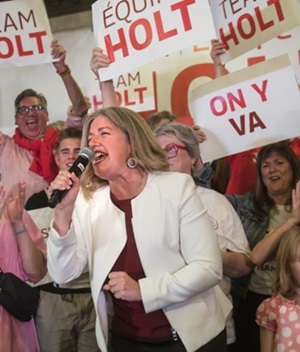
For those who can’t take their eyes off the super-anxious race for the coming November 5, 2024 general election in the USA today, the October 21, 2024 provincial election in the Canadian province of New Brunswick could also provide some comfort.
Here the progressives in the Liberal and Green parties combined took a commanding 62% of the popular vote, while the Conservatives won only 35%. (And even if you add the remaining 3% of the vote to the conservative column, the total is only 38%!)
Wouldn’t it be nice if Kamala Harris’s Democrats could do something similar in Democracy in America next door on November 5? Meanwhile, our profound congratulations to Susan Holt and her 30 other Liberal MPs in the new Legislative Assembly of New Brunswick — along with the two additional Green Party progressives led by David Coon!
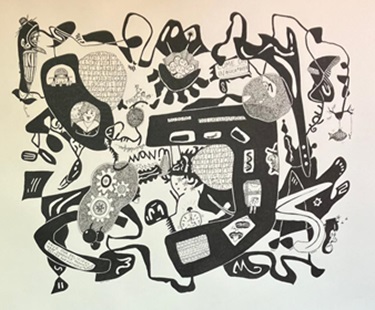
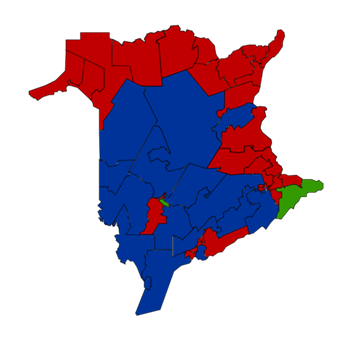


I’m writing the night of the U.S. Election….focusing on adjacent issues such as this while the fate of the ….. (US? North America? World as we know it?) (reader please fill in) awaits the results. As noted by the author, yes, the surprise results of New Brunswick’s complete change in government, including the previous Premier’s loss of seat are transformative, in a very hopeful way. By the time others read this, the actual results of the election will be well known, or at least close to determined. HOPEFULLY at least some transformation will have happened. Nova Scotia will be holding an election soon too. The results don’t have the likely results of New Brunswick – but the NDP has an excellent chance of holding the second highest number of seats. Sigh, at least another 4 hours before the initial results…off to cause more chaos….